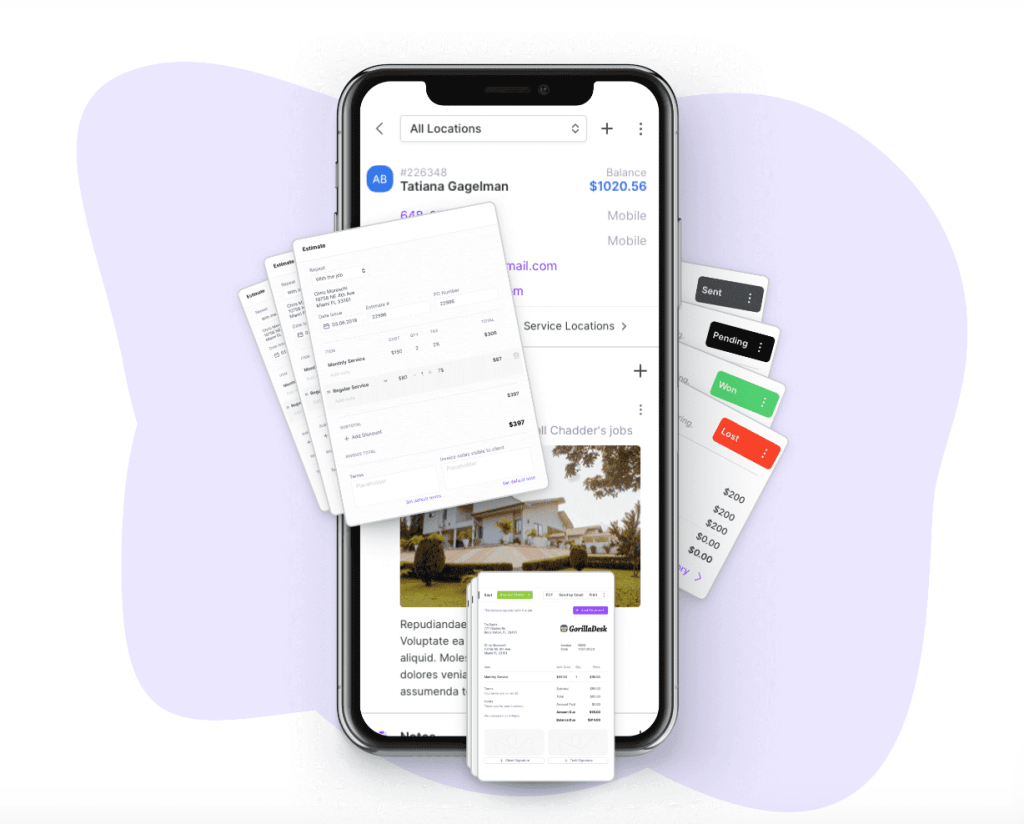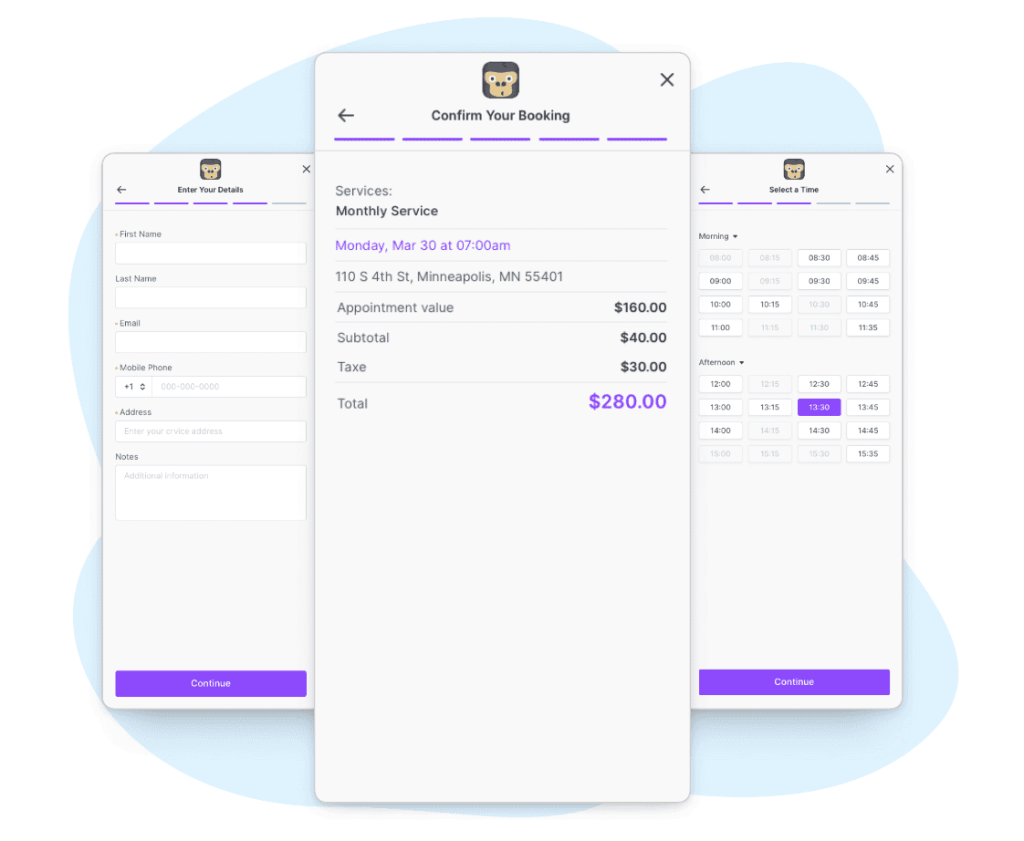Why and how to start a mosquito spraying business
GorillaDesk Staff

There are about 200 species of mosquitoes in the United States—which is a lot of pesky insects buzzing around our backyards.
These pests are increasingly bothering Americans. In fact, 63% of pest management companies reported an increase in requests for mosquito control services in 2022 compared to the previous year, according to the 2023 State of the Mosquito Control Market Report.
But this trend isn’t new. In 2014, a National Institutes of Health study revealed that mosquitoes kept 59.5% of New Jersey residents from enjoying outdoor activities that summer.
What do all these statistics mean for you and your business? Opportunity.
There’s more than enough demand for mosquito spraying services, and you could be the one to serve that niche. By offering mosquito spraying services, you can set yourself apart from your competitors and reach new customers.
Let’s explore how to start a mosquito spraying service and strategies for ensuring that your endeavor is successful.
Why is mosquito spraying a valuable pest control niche?
Establishing a niche allows your pest control company to develop a deep expertise in a specific area, which makes you stand out from more general pest control services. If customers need help with a particular service, chances are they’d prefer to contact a specialist versus a generalist.
Here are a few reasons why mosquito spraying is a good niche to claim:
- Demand: According to the 2023 PCT State of the Mosquito Control Market study, 63% of pest management professionals anticipated that mosquito-related services would lead to greater profits in that year.
- Health concerns: The public health threat of mosquito-borne illnesses, including malaria, West Nile virus, and Dengue Fever, motivates consumers to sign up for services, even without an infestation present.
- Seasonal advantages: Mosquito populations surge in the warmer months, especially during rainy periods in the summer. Providing spraying services this time of year guarantees that you’ll have a demand to meet.
First steps: Necessary training and licensing for mosquito spraying
As with starting a pest control business, prepping to offer mosquito spraying services requires advanced research to ensure that you attain the proper licenses and follow government regulations.
Before you start your mosquito spraying business, here are some things you absolutely must look into:
Federal and state regulations
The U.S. Environmental Protection Agency (EPA) requires anyone who applies restricted use pesticides (RUPs) to be a certified applicator or someone under the certified applicator’s direct supervision.
While the general public can purchase general use pesticides, they can’t purchase RUPs like Malathion or Naled. RUPs are often more powerful than general pesticides and are therefore more effective.
Other primary federal regulations for mosquito spraying include:
- The Federal Insecticide, Fungicide, and Rodenticide Act: You must register all pesticides you use for mosquito control with the EPA. Pesticide labels must provide detailed instructions on use, safety precautions, and disposal, and users must follow these labels to avoid legal issues and health hazards.
- The Clean Water Act: Businesses that apply pesticides to bodies of water must obtain National Pollutant Discharge Elimination System permits, which ensure that pesticides do not harm water quality.
- Occupational Safety and Health Administration (OSHA) Regulations: OSHA sets standards for worker safety, including proper pesticide handling, storage, and application and the use of personal protective equipment (PPE).
In addition, state-level regulations might require regular pesticide use reporting and record-keeping. They may also establish buffer zones, like schools or hospitals, where pesticides aren’t allowed.
Proper certifications
Each state regulates pest control licenses, including mosquito spraying licenses, slightly differently. If you’re already operating a pest control business and are just adding mosquito spraying services, you may already have most of the required certifications. But if you’re new to the industry, you’ll want to check all state requirements before starting your business.
Here are a few common certifications that are necessary for mosquito spraying:
- Pesticide applicator license: Certifies that individuals are qualified to apply pesticides safely and effectively and adhere to regulatory standards
- Commercial pest control operator license: Authorizes professionals to operate a pest control business and apply pesticides commercially
- Public health pest control license: Ensures that operators are trained to manage pests that pose a risk to public health, with a focus on safety and regulatory compliance
- Hazardous materials safety certification: Verifies that operators are trained in the safe handling and application of hazardous materials used in pesticides
- Integrated pest management certification: Demonstrates knowledge and skills in sustainable pest management practices that minimize environmental impact
To get certified, contact your state’s certifying agency.
Safety training
While your employees don’t technically need a license as long as you’re directly supervising them, you’ll still want to provide your technicians with proper safety training before sending them out into the field.
Here are a few aspects to cover in your employee safety training:
- Proper pesticide handling and application: Training on the correct methods for mixing, applying, and disposing of pesticides can prevent accidental exposure or environmental contamination.
- PPE: Instruction on selecting and using appropriate PPE, such as gloves, masks, and protective clothing, minimizes the risk of chemical exposure.
- Emergency response procedures: By giving teams clear instructions on spills, accidental exposure, and emergency response, including basic first aid, businesses can prevent many workplace injuries. Some operators also equip technicians with a lone worker device to ensure they can reach out for assistance when working in isolated or hazardous conditions.
- Label reading: An emphasis on the importance of reading and following all instructions on pesticide labels ensures their safe and effective use.
- Environmental protection: Training on how to minimize environmental impact, such as avoiding pesticide runoff into water sources and protecting non-target species, helps your brand stand out as environmentally conscious.
- Record keeping: Instruction on maintaining accurate pesticide use records, applications, and safety measures ensures regulatory compliance and more accurate inventory.
Step-by-step: How to start a mosquito spraying business
Once you’re covered from a legal and regulatory standpoint, follow these steps to get your mosquito spraying business up and running:
1) Define your services
Begin by clearly outlining the range of services you plan to offer. Will you focus solely on mosquito spraying, or will you include other pest control services as well? If you’re already an established pest control company, how will adding mosquito spraying impact your existing services?
Consider the types of treatment methods you’ll use, such as larvicides, adulticides, or natural alternatives. Defining your services will help you target your market effectively and establish a clear value proposition for potential customers.
2) Create a business plan
A solid business plan is essential for any successful venture. Write out your business goals, target market, competitive analysis, marketing strategies, pricing, and financial projections.
This plan will serve as a roadmap for your business and will be crucial when you seek financing or investors. Be sure to outline your operational plan as well, including how you will manage daily activities, customer service, and growth.
3) Build your brand
Your brand is your business identity, so invest time in creating one that is strong and memorable. This includes designing a professional logo, choosing a business name that resonates with your target audience, and creating a consistent color scheme and message.
Your brand should convey trust, reliability, and effectiveness in pest control, which will help you attract and retain customers.
4) Register your business
Ensure that your business complies with legal regulations by registering it with the appropriate local, state, and federal authorities. Choose the right business structure (such as sole proprietorship, LLC, or corporation) and obtain any necessary licenses and permits. Compliance with regulations helps you build credibility and avoid legal issues down the line.
To learn more about registering your mosquito spraying business, refer to the EPA’s Pesticide Registration Manual.
5) Get insurance
Protect your business by obtaining the necessary insurance coverage. This typically includes general liability insurance, workers’ compensation insurance if you have employees. It’s important to understand how workers’ compensation laws apply. For example, if you operate in North Carolina and are looking for expert help, resources like Wilmington Workers’ Compensation Lawyer can help clarify employer obligations specific to your location.
Proper insurance safeguards your business from potential risks and liabilities and provides peace of mind for both you and your clients.
6) Open a bank account
Keep your personal and business finances separate by opening a dedicated business bank account. Doing so helps with financial organization, simplifies tax preparation, and builds your business credit.
Consider also setting up a business credit card to manage expenses and provide additional financial flexibility.
7) Invest in equipment
Acquire the necessary equipment and supplies to start your mosquito spraying operations. This includes sprayers, protective gear, pesticides, and other related tools.
Investing in high-quality equipment ensures efficient and effective service delivery, which is crucial for customer satisfaction and business success. Regularly maintain and upgrade your equipment to stay competitive and compliant with industry standards.
How much does it cost to start a mosquito spraying business?
The costs for starting your mosquito spraying business will vary widely based on location, business size, and the level of technology and equipment you choose to invest in.
Here’s a high-level view of what to expect:
- Start-up: The initial license and exam will cost you $120 to $2,000, depending on your state and the specific licenses it requires.
- Insurance: Initial premiums range from $500 to $3,000 per year for basic general liability coverage.
- Supplies: Pest control equipment and tools, including sprayers, vehicles, safety gear, and uniforms, can cost between $5,000 and $50,000, depending on your needs.
- Software: Pest control management software, which includes a customer relationship management (CRM) system, communication tools, payment processing software, accounting software, and marketing technology, costs between $300 and $1,000 for initial subscriptions (and renews on a monthly or yearly basis).
- Training: Official training courses can cost between $200 and $1,000 per technician. Typically, you can get a discount if you train multiple technicians at once.
- Marketing and branding: Depending on how professional you’d like your website to be and how much you want to invest in your logo and other marketing assets, your initial branding could cost anywhere from $1,000 to $10,000.
3 tips for turning a profit in year one
Whether you’re starting a brand-new mosquito spraying business or adding mosquito treatments to your list of existing services, your goal is the same: you want to be profitable.
Here are three ways to maximize your profits during your first year of business:
1) Provide excellent customer service
“The customer is king” is an age-old mantra, but it still holds true today. If you want to establish yourself as a reputable, reliable service provider, you must provide top-notch customer service and communications.
GorillaDesk’s pest control CRM helps you keep track of your customers. (Source: GorillaDesk)
By using a pest control CRM like GorillaDesk, you can manage all of your customer information in one central place. Use this to keep a detailed history of customer interactions and services so you can personalize future follow-ups, send outstanding invoices, or share applicable service offers.
GorillaDesk’s customer portal brings your customers’ service information directly to their devices. (Source: GorillaDesk)
GorillaDesk also offers customer portal software so your customers can directly access service estimates, manage upcoming appointments, and make online payments. Today’s consumers value convenience more than ever before, and industry-leading software like GorillaDesk will provide them with just that.
2) Employ effective marketing strategies
Marketing is an essential part of starting a new mosquito spraying business. If you don’t market your services properly, your target customers won’t know you exist.
Consider a mix of traditional pest control marketing tactics—like physical signage—and digital marketing tactics, like creating social media accounts, building an SEO-optimized website, and running Google Ads, to promote your business.
You can also offer package discounts or subscription discounts to encourage more customers to sign up for services in your business’s early days.
3) Grow your network
When it comes to services that protect someone’s home and family, the number one reason they’ll choose to work with a specific company is trust.
Trust isn’t something your business will inherently have—it’s something you’ll need to earn. This can be difficult when you’re just starting out, but it’s not impossible.
Start with basic networking. Talk to family, friends, and neighbors and promote your new business. Once you have a few customers, you can start a referral program. Referral programs give existing customers a discount for referring new customers to your business. This will encourage customer loyalty and retention, making it easier for you to build a solid customer base early on.
Start building your mosquito spraying company
The pest control industry is highly competitive, but offering a specialized service like mosquito spraying can help you stand out.
To be successful, your business will need a strong foundation. This includes obtaining licenses, permits, and insurance, but it also involves training your technicians on industry best practices, building strong relationships with your clients, and using technology to efficiently grow your business.
One essential piece of technology to help you maintain relevance in today’s market is a pest control CRM like GorillaDesk. A CRM not only helps you manage your customers’ information but also allows you to schedule appointments, plan your technicians’ routes in advance, and keep track of chemical usage and reporting.
Check out GorillaDesk’s CRM features with your 14-day free trial today.
Other posts to check out
Make the move from paper to digital: A step-by-step guide for field service pros
If your field service business is still doing business on paper, it’s time to make a change. Here’s how to find success with a move to digital.
Pest control marketing: Let’s make that phone ring
With so many other local pest control companies making competition tight, keeping that phone ringing with new customers may not feel as easy as you thought. To keep your pest control business growing takes marketing know-how. Here are our best tips.
How to get more positive customer feedback
Customers trust online reviews just as much as word of mouth from friends and family. The truth is: Online reviews can make or break your local services business. Here’s how to build that glowing reputation your service deserves.
Tree service marketing: 11+ ideas to drive more customers in 2026
Drive more leads with our ultimate tree service marketing guide! Discover 11+ proven strategies to grow your business and attract the right customers.
How to start a tree service business in 2026
Learn how to start a tree service business with step-by-step guidance on planning, licensing, equipment, marketing, safety, and scaling your company.
Landscaping services list: What to offer your customers
Discover the top landscaping services to offer for maximum profit. From design to maintenance, expand your business with our comprehensive landscaping services list.
Transform your business
Try it free for 14 days. No credit card required. Instant setup.
★★★★★
We will be customers for life
“I can not say enough good things about GorillaDesk it saves us so much time and money. The customer service is the best. I would recommend GorillaDesk to anyone no matter what industry. I trained my employee in 5 minutes on how to use it. We will be customers for life.”

Ryan Sullivan
Business Owner
Ready to Get Started?
Get all our amazing features and top-rated support, with no credit card required.








